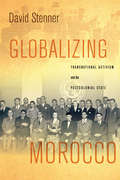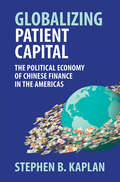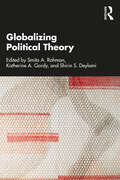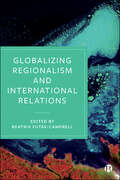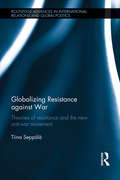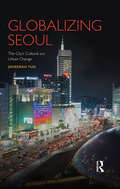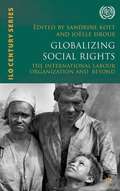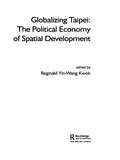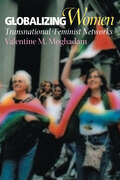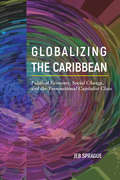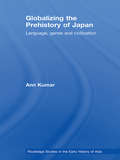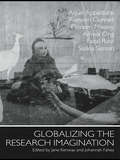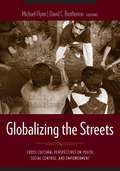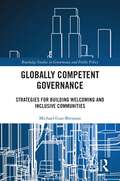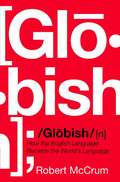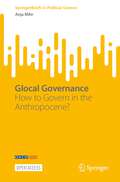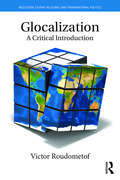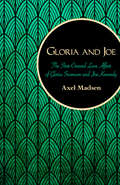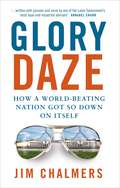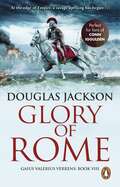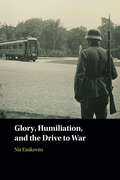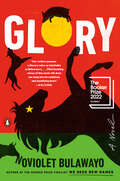- Table View
- List View
Globalizing Morocco: Transnational Activism and the Postcolonial State
by David StennerThe end of World War II heralded a new global order. Decolonization swept the world and the United Nations, founded in 1945, came to embody the hopes of the world's colonized people as an instrument of freedom. North Africa became a particularly contested region and events there reverberated around the world. In Morocco, the emerging nationalist movement developed social networks that spanned three continents and engaged supporters from CIA agents, British journalists, and Asian diplomats to a Coca-Cola manager and a former First Lady. Globalizing Morocco traces how these networks helped the nationalists achieve independence—and then enabled the establishment of an authoritarian monarchy that persists today. David Stenner tells the story of the Moroccan activists who managed to sway world opinion against the French and Spanish colonial authorities to gain independence, and in so doing illustrates how they contributed to the formation of international relations during the early Cold War. Looking at post-1945 world politics from the Moroccan vantage point, we can see fissures in the global order that allowed the peoples of Africa and Asia to influence a hierarchical system whose main purpose had been to keep them at the bottom. In the process, these anticolonial networks created an influential new model for transnational activism that remains relevant still to contemporary struggles.
Globalizing Patient Capital: The Political Economy of Chinese Finance in the Americas
by Stephen B. KaplanChina's overseas financing is a distinct form of patient capital that marshals the country's vast domestic resources to create commercial opportunities internationally. Its long-term risk tolerance and lack of policy conditionality has allowed developing economies to sidestep the fiscal austerity tendencies of Western markets and multilaterals. Employing statistical tests and extensive field research across China and Latin America, Stephen Kaplan finds that China's patient capital endows national governments with more room to maneuver in formulating domestic policies. The author goes on to evaluate the potential costs of Chinese financing, raising the question of how Chinese lenders will react to developing nation's ongoing struggles with debt and dependency. By disaggregating the structure of international finance, Globalizing Patient Capital has significant implications for the rise of China in Latin America, offering new insights about globalization and showing the costs and benefits of state versus market approaches to development.
Globalizing Political Theory
by Smita A. Rahman Shirin S. Deylami Katherine A. GordyGlobalizing Political Theory is guided by the need to understand political theory as deeply embedded in local networks of power, identity, and structure, and to examine how these networks converge and diverge with the global. With the help of this book, students of political theory no longer need to learn about ideas in a vacuum with little or no attention paid to how such ideas are responses to varying local political problems in different places, times, and contexts. Key features include: Central Conceptual Framework: Introducing readers to what it means to “globalize” political theory and to move beyond the traditional western canon and actively engage with a multiplicity of perspectives. Organization: Focused on key topics essential for an introductory class aimed at both globalizing political theory and showing how political theory itself is a globalizing activity. Themes: Colonialism and Empire; Gender and Sexuality; Religion and Secularism; Marxism, Socialism, and Globalization; Democracy and Protest; and Race, Ethnicity, and Indigeneity. Pedagogy: Each chapter features theoretical concepts and definitions, political and historical context, key authors and biographical context, textual evidence and exegesis from the foundational texts in that thematic area, a list of discussion questions, and a list of resources for further reading. Committed to a multiplicity of perspectives and an active engagement between the global and the local, Globalizing Political Theory connects directly with undergraduate and graduate-level courses in political theory, global political theory, and non-western political thought.
Globalizing Political Theory
by Smita A. Rahman Shirin S. Deylami Katherine A. GordyGlobalizing Political Theory is guided by the need to understand political theory as deeply embedded in local networks of power, identity, and structure, and to examine how these networks converge and diverge with the global. With the help of this book, students of political theory no longer need to learn about ideas in a vacuum with little or no attention paid to how such ideas are responses to varying local political problems in different places, times, and contexts.Key features include: Central Conceptual Framework: Introducing readers to what it means to “globalize” political theory and to move beyond the traditional western canon and actively engage with a multiplicity of perspectives. Organization: Focused on key topics essential for an introductory class aimed at both globalizing political theory and showing how political theory itself is a globalizing activity. Themes: Colonialism and Empire; Gender and Sexuality; Religion and Secularism; Marxism, Socialism, and Globalization; Democracy and Protest; and Race, Ethnicity, and Indigeneity. Pedagogy: Each chapter features theoretical concepts and definitions, political and historical context, key authors and biographical context, textual evidence and exegesis from the foundational texts in that thematic area, a list of discussion questions, and a list of resources for further reading. Committed to a multiplicity of perspectives and an active engagement between the global and the local, Globalizing Political Theory connects directly with undergraduate and graduate-level courses in political theory, global political theory, and non-western political thought.
Globalizing Regionalism and International Relations
by Beatrix Futak-CampbellBuilding on the recent initiative to truly globalize the field of international relations, this book provides an innovative interrogation of regionalism. The book applies a globalizing framework to the study of regional worlds in order to move beyond the traditional conception of regionalism, which views regions as competing blocs dominated by great powers. Bringing together a wide range of case studies, the book shows that regions are instead dynamic configurations of social and political identities in which a variety of actors, including the less powerful, interact and partake in regionalization processes and have done so through the centuries.
Globalizing Resistance against War: Theories of Resistance and the New Anti-War Movement (Routledge Advances in International Relations and Global Politics)
by Tiina SeppäläThe political revival of the anti-war movement after 9/11 launched a controversial debate on global resistance. Through detailed study of the anti-war movement in Britain, this book critically evaluates the theoretical debate from the perspective of ‘critical theory in political practice’. This book presents new arguments and theoretical framework to consider globalized resistance to war. In an attempt to develop the theoretical debate further, this book analyses two strands of current thought; liberal cosmopolitanism which considers the movement a consensual force of opposition against war in the form of global civil society, and radical poststructuralism which speaks of the Multitude’s ‘war against war’.. Including detailed empirical case study of four anti-war organizations; the Stop the War Coalition, the Campaign for Nuclear Disarmament, Globalise Resistance and War Resisters’ International, the author illustrates the limitations of the abstract nature of current theorizing and highlights the need for theory to be more engaged with political practice. While revealing tensions and conflicts within the new anti-war movement, the study not only underlines the need to critically analyse the dominant theoretical discourses but also suggests that the movement would benefit from a more open discussion about the complex relationship between unity and diversity. Globalizing Resistance against War is invaluable reading for students and scholars of International Sociology, International Relations, War and Peace Studies, International Theory and Political Theory.
Globalizing Seoul: The City's Cultural and Urban Change (Planning, History and Environment Series)
by Jieheerah YunIn the decades following the 1997 Asian economic crisis, South Korea sought segyehwa (globalization). Evidence of this is no more evident than in the country’s capital, Seoul, where urban development has been central to making the city a global hub and not just the centre of the national economy. However, recent development projects differ from those of the past in that they no longer focus solely on economic efficiency, but on the deployment of a new urban aesthetics. As Jieheerah Yun reveals in Globalizing Seoul: The City’s Cultural and Urban Change, the pursuit of globalization and the rebranding of Seoul’s image from hard industrial city to soft cultural city have shaped the urban development of the city. Following a brief urban history of Seoul, she focuses on two key themes. In the first, how globalization has contributed to refashioning Korean traditions, she analyzes the policies and actions to preserve Korean folk houses and pre-industrial street layouts, looking in detail at the Bukchon and Insadong areas of the city. Her second theme is an examination of migration and the generation of new minority neighbourhoods amidst the segyehwa policies and the state’s efforts to build a multicultural society. In detailed case studies of the redevelopment of Dongdaemun Market as part of rebranding Seoul as the ‘world design capital’ and of the Itaewon area as both a Special Tourist Zone and a Global Cultural Zone, she shows how multi-ethnic neighbourhoods are threatened by lack of consideration for economic justice and housing provision.
Globalizing Social Rights
by Sandrine Kott Joëlle DrouxBased on the case of the ILO, both as an actor and driver of international social policy, this collection explores the internationalization process of social rights, in a number of national and international contexts. This collection brings together a variety of new scholarship by a group of highly qualified and internationally renowned scholars.
Globalizing Taipei: The Political Economy of Spatial Development (Planning, History and Environment Series)
by Reginald Yin-Wang KwokTaipei's quest to become a global city is the key to its urban development. Globalizing Taipei looks at this "Asian Dragon", a major city in the South China Growth Triangle and a centre for transnational production, revealing how the development of this capital has received firm state support but is conditioned by international and domestic politics.The book is divided into four parts: economic and spatial restructuring, state and society realignment, social differentiation and cultural reorientation. Each analyzes the interaction of international, state and local politics in the shaping of the city's urban environment since World War II.All contributors to this edited volume are Taiwan scholars presenting critical insiders' views. Based on each author's specialization and research focus, each chapter provides an in-depth consideration of one of Taipei's developmental issues generated by globalization. Collectively they provide broad, insightful and coherent coverage of this crucial time in Taipei's global transmutation.
Globalizing Women: Transnational Feminist Networks (Themes in Global Social Change)
by Valentine M. MoghadamWinner of the Victoria Schuck award given by the American Political Science Association and an Honorable Mention in the Distinguished Book Award given by the Political Economy of World Systems section of the American Sociological AssociationGlobalization may offer modern feminism its greatest opportunity and greatest challenge. Allowing communication and information exchange while also exacerbating economic and social inequalities, globalization has fostered the growth of transnational feminist networks (TFNs). These groups have used the Internet to build coalitions, lobby governments, and advance the goals of feminism.Globalizing Women explains how the negative and positive aspects of globalization have helped to create transnational networks of activists and organizations with common agendas. Sociologist Valentine M. Moghadam discusses six such feminist networks to analyze the organization, objectives, programs, and outcomes of these groups in their effort to improve conditions for women throughout the world. Moghadam also examines how "globalizing women" are responding to and resisting growing inequalities, the exploitation of female labor, and patriarchal fundamentalisms. This book is an important addition to literature exploring feminism as well as to the broader discussion of the impact of transnational social movements and organizations in the globalized world.
Globalizing the Caribbean: Political Economy, Social Change, and the Transnational Capitalist Class
by Jeb SpragueThe beautiful Caribbean basin is fertile ground for a study of capitalism past and present. Transnational corporations move money and labor around the region, as national regulations are reworked to promote conditions benefiting private capital. Globalizing the Caribbean offers a probing account of the region’s experience of economic globalization while considering gendered and racialized social relations and the frequent exploitation of workers. Jeb Sprague focuses on the social and material nature of this new era in the history of world capitalism. He combines an historical overview of capitalism in the region with theoretical analysis backed by case studies. Sprague elaborates upon the role of class formation and the restructuring of local states. He considers both U.S. hegemony, and how various upsurges from below and crises occur. He examines the globalization of the cruise ship and mining businesses, looks at the growth of migrant labor and reverse flow of remittances, and describes the evolving role of export processing and supranational associations. In doing so, Sprague shows how transnationally oriented elites have come to rule the Caribbean, and how capitalist globalization in the region occurs alongside shifting political, institutional, and organizational dynamics.
Globalizing the Prehistory of Japan: Language, genes and civilisation (Routledge Studies in the Early History of Asia)
by Ann KumarThis iconoclastic work on the prehistory of Japan and of South East Asia challenges entrenched views on the origins of Japanese society and identity. The social changes that took place in Japan in the time-period when the Jomon culture was replaced by the Yayoi culture were of exceptional magnitude, going far beyond those of the so-called Neolithic Revolution in other parts of the world. They included not only a new way of life based on wet-rice agriculture but also the introduction of metalworking in both bronze and iron, and furthermore a new architecture functionally and ritually linked to rice cultivation, a new religion, and a hierarchical society characterized by a belief in the divinity of the ruler. Because of its immense and enduring impact the Yayoi period has generally been seen as the very foundation of Japanese civilization and identity. In contrast to the common assumption that all the Yayoi innovations came from China and Korea, this work combines exciting new scientific evidence from such different fields as rice genetics, DNA and historical linguistics to show that the major elements of Yayoi civilization actually came, not from the north, but from the south.
Globalizing the Research Imagination
by Jane Kenway Johannah FaheyIn the provocative opening essay Kenway and Fahey explore ways in which the notion of the imagination itself might be mobilized by researchers. They are encouraged to develop 'defiant' global imaginations and communities with the capacities to think, 'be' and 'become' differently in a world of research increasingly governed by rampant reductionist rationality. To support this view there follows a series of detailed interviews with some of the world's leading intellectuals where the editors explore what it might mean to globalize the research imagination. The interviewees, Arjun Appadurai, Raewyn Connell, Doreen Massey, Aihwa Ong, Fazal Rizvi and Saskia Sassen, are foremost in their research fields and their views related here are both influential and inspirational. This thought-provoking book for students and researchers identifies and critically interrogates the various ways in which globalization reshapes research investigates the challenges that globalization poses for the social sciences and humanities creates an understanding of how globalization is transforming the practice of research and doctoral research training Progressive researchers in the social sciences and humanities urgently need to decide for themselves how best to globalize research methodologies and communities, and this book will be an invaluable resource for them.
Globalizing the Streets: Cross-Cultural Perspectives on Youth, Social Control, and Empowerment
by Flynn Michael David C. BrothertonThe contributors to this volume examine the struggle for identity and interdependence of these youth, their clashes with law enforcement and criminal codes, their fight for social, political, and cultural capital, and their efforts to achieve recognition and empowerment.
Globally Competent Governance: Strategies for Building Welcoming and Inclusive Communities (Routledge Studies in Governance and Public Policy)
by Michael Guo-BrennanGlobally Competent Governance explores promising policies and practices developed by local governments and other community leaders across the United States and beyond in their efforts to build welcoming and inclusive communities and globally competent governments.Cities of the future, be they large, regional metropolitan centers of commerce and political power, regional hubs that service central metropolitan regions, or smaller suburban or rural centers that cater to agriculture or regional commerce, will continue to evolve. Globalization and global mobility have greatly increased the cultural, ethnic, linguistic, and religious diversity in cities and communities around the globe and demand local governments build welcoming and inclusive communities for all residents, particularly newcomers. Leaders, both in and out of government, must be prepared to respond to changing needs and manage any potential challenges this may create. To better understand what local officials are facing and what they are doing to manage change, the author presents data collected through surveys and individual interviews of local officials and other community influencers. Based on these findings, the book analyzes the current state of cities and makes policy recommendations for moving forward.This book will be of interest to advanced undergraduate and postgraduate students, researchers, and academics in the fields of public policy, governance, immigration, community engagement, social welfare, and political science, as well as professionals in government and nongovernmental organizations. It will also interest professionals working with immigrants and in immigration policy.
Globish: How the English Language Became the World's Language
by Robert MccrumIn this provocative and compelling new work, the co-author of the bestselling book and television series "The Story of English" shows how English became the language of the world.
Glocal Governance: How to Govern in the Anthropocene? (SpringerBriefs in Political Science)
by Anja MihrThis open access book develops a conceptual framework for glocal governance as a multi-stakeholder local governance approach based on global human rights norms and democratic principles. It discusses glocal governance as part of an ongoing global transformation process that began in the 1990s, when democracy and individualizing responsibilities for governance became the dominant political system worldwide, and continues through today’s dawn of a New Cold War between those countries which have democratized and those which haven’t. This book will intrigue practitioners and scholars alike who are interested in the concepts of glocality and glocalism, local-global connectivity, and the implementation and dissemination of global norms and concepts such as human rights and democracy, at the local and community level as well as among civil society and private enterprises. The author argues that global norms have now become universal benchmarks which private, political, and civil actors use to assess day-to-day situations and market developments, and to make their decisions accordingly. This book will appeal to students, practitioners, and scholars of the social sciences and humanities who are interested in governance, human rights, public diplomacy and international relations; and in conceptualizing mechanisms for governing and enforcing political decisions locally, on the basis of global universal principles, international norms, and laws.
Glocalization: A Critical Introduction (Routledge Studies in Global and Transnational Politics)
by Victor RoudometofThis book seeks to provide a critical introduction to the under-theorized concept of Glocalization. While the term has been slowly diffused into social-scientific vocabulary, to date, there is no book in circulation that specifically discusses this concept. Historically theorists have intertwined the concepts of the ‘global’ and the ‘glocal’ or have subsumed the ‘glocal’ under other concepts – such as cosmopolitanization. Moreover, theorists have failed to give ‘local’ due attention in their theorizing. The book argues that the terms ‘global’, the ‘local’ and the ‘glocal’ are in need of unambiguous and theoretically and methodologically sound definitions. This is a prerequisite for their effective operationalization and application into social research. Glocalization is structured in two parts: Part I introduces the term, seeking to provide a history and critical assessment of theorists' past use of glocalization and offering an alternative perspective and a clear, effective and applicable definition of the term, explaining the limitations of the term globalization and the value of defining glocalization. Part II then moves on to illustrate how the concept of glocalization can be used to broaden our understanding and analysis of a wide range of issues in world politics including the 21st century culture of consumption, transnationalism & cosmopolitanism, nationalism, and religious traditions. Utilizing a wide range of historical, ethnographic and real-life examples from various domains this work will be essential reading for students and scholars of Globalization and will be of great interest to those in the field of Global, Transnational and Cosmopolitan Studies.
Glocalized Security: Domestic and External Issues in International Security
by Abu Bakarr BahWhat forces drive violent conflicts, and whose interests are protected by military involvement? In those conflicts, how do domestic factors fuse with external dynamics, and what issues spell the difference between successful and failed intervention?Enter Glocalized Security—a concept that argues that this fusion of domestic and external matters produces new war dynamics which require both substantial domestic reforms and realignment of external interests to achieve sustainable peace. In this edited collection, contributors use this concept to examine grievances and interests in and around war-torn countries. Combining a variety of disciplines, from sociology and political science to peace studies and public policy and administration, these case studies draw from over three decades of international military interventions around the world, including Afghanistan, Turkey, Somalia, Iraq, Nigeria, and Nepal. Analyzing the intersectional relationship of the local and global, Glocalized Security provides new insights into the problems of international security and why international military interventions often fail to ensure peace and security in conflict zones where these factors have morphed into terrorism warfare or zones of national interest among major world and regional powers.By focusing on ethnicity, religion, poverty, governance, and the other most common motivators of violent conflicts, Glocalized Security provides a crucial conceptual basis for understanding international relations in the twenty-first century.
Gloria and Joe
by Axel MadsenThe ultimate Hollywood story revealed: the sizzling relationship between Joseph Kennedy, patriarch of America's most influential political family, and Gloria Swanson, one of the most prominent silent film stars of her day. Gloria and Joe were in love with each other and with the movies, especially Queen Kelly, which completed the real-life ménage à trois. Starring along with the star of the screen and the Boston Brahman in this exposé are Erich von Stroheim, Kennedy's wife Rose, Swanson's husband, and a cast of colorful hangers-on. Madsen recreates their love, scandal, and world, which in its extravagance and intrigue has never been surpassed.
Glory Daze: How a world-beating nation got so down on itself
by Jim ChalmersWhy does Australia, a nation with one of the world's best economies, have such a dim view of its own performance? Why does it see itself as worse off than some of the basket-case economies of southern Europe? How did a country that was smart enough to avoid recession and mass unemployment despite a global meltdown get so down on itself? In Glory Daze Jim Chalmers argues that the combination of hyper-partisanship and self-serving incentives in politics have resulted in a deficit of national self-esteem. This insider account provides a unique perspective on national identity. Chalmers concludes that unless a stop is put to the poisonous politics of recent years, Australia runs the risk of squandering existing national advantages and compromising our ability to tackle the challenges of the future.
Glory and Hope: Inaugural Speech May 10, 1994
by Nelson MandelaSummary: "Glory and Hope" By Nelson Mandela "Glory and Hope" was Nelson Mandela's 1994 inaugural speech as the first democratically elected State President of South Africa. At the time, South Africa was in a rough transition from a system of Apartheid with segregation of people based on race and class divisions to a system with renewed hope for equality to all of their citizens. As the first democratically elected State President of South Africa, Nelson Mandela planned to ease the transition, giving the Africans a sense of pride and security; this speech is the first example of his effort. Reading this speech, the reader encounters lines that tell of pride, passion, and devotion. They realize that Nelson Mandela wrote the speech with his heart rather than with his mind. After tough times, Mandela is not ashamed of his land and believes that with hard work and patience from the citizens of South Africa, they can "reinforce humanity's belief in justice, strengthen its confidence in the nobility of the human soul and sustain all hopes of a glorious life for all,"(Glory and Hope by Nelson Mandela).
Glory of Rome: (Gaius Valerius Verrens 8): Roman Britain is brought to life in this action-packed historical adventure (Gaius Valerius Verrens #8)
by Douglas JacksonA riveting and all-action historical page-turner from bestselling author Douglas Jackson that will have you gripped from page one! Perfect for fans of Simon Scarrow and Ben Kane.Readers are loving Gaius Valerius Verrens! "The best Roman historical series I've yet read. Just pips Ben Kane and Conn Iggulden." - 5 STARS "I found this one hard to put down as there was action and intrigue from start to finish" - 5 STARS"Fantastic story and character creation" - 5 STARS"A simple plot but pace never lets up and keeps you wanting to "just read the next chapter before I put it down" - 5 STARS*************************************77AD. Gaius Valerius Verrens is an honoured member of Emperor Vespasian's inner circle, but the enmity between him and Vespasian's son Domitian means that, even in Rome, danger is never far away.Meanwhile, in the outer reaches of the Empire, in Britannia, trouble is brewing.The governor, Agricola is preparing to march his legions north and Valerius is Agricola's chief legal adviser and deputy governor. It's the opportunity he seeks to move his wife and son out of reach of Domitian's wrath.The massacre of a Roman garrison and suspicious death throw Agricola's preparations into confusion. Now his eyes turn west to Mona and the Druids, who still harbour hopes of ridding Britannia of Roman rule. But to deal with them, Agricola needs a soldier he can trust to lead the legion. Only one man in the province has the experience and the ability . . .So a reluctant Valerius picks up his sword once more. He soon comes to understand that any glory his new legion wins is likely to be fleeting and tainted - and that he has placed his family in deadly peril.Gaius Valerius Verrens's adventures conclude in Hammer of Rome.
Glory, Humiliation, and the Drive to War
by Nir EisikovitsFrom Hitler's determination to erase Germany's disgrace after World War I, to Sadat's promise to undo Egypt's humiliation in 1967, to ISIS's proclamations that it would end the “emasculation” of Muslims and restore the glory of the Caliphate, a sense of political humiliation and a desire for martial glory have always been central in the drive to war. Yet although glory and humiliation are the twin engines of conflict, and together they spur individuals and nations to violence, philosophers have shown little interest in these dispositions. In this book Nir Eisikovits offers a philosophical account of political humiliation, martial glory, and the relationship between them. Drawing on philosophy, literature, and psychology, Eisikovits argues that it is impossible to understand why people are drawn to war and how wars are justified without making sense of these two political passions and the ways in which they inflame each other.
Glory: A Novel
by NoViolet Bulawayo2022 BOOKER PRIZE FINALIST &“Manifoldly clever…brilliant… &‘Glory&’ is its own vivid world, drawn from its own folklore. This is a satire with sharper teeth, angrier, and also very, very funny.&” —Violet Kupersmith, The New York Times Book Review "Genius."—#1 New York Times bestselling author Jason ReynoldsFrom the award-winning author of the Booker-prize finalist We Need New Names, an exhilarating novel about the fall of an oppressive regime, and the chaos and opportunity that rise in its wake.NoViolet Bulawayo&’s bold new novel follows the fall of the Old Horse, the long-serving leader of a fictional country, and the drama that follows for a rumbustious nation of animals on the path to true liberation. Inspired by the unexpected fall by coup in November 2017 of Robert G. Mugabe, Zimbabwe&’s president of nearly four decades, Glory shows a country's imploding, narrated by a chorus of animal voices that unveil the ruthlessness required to uphold the illusion of absolute power and the imagination and bulletproof optimism to overthrow it completely. By immersing readers in the daily lives of a population in upheaval, Bulawayo reveals the dazzling life force and irresistible wit that lie barely concealed beneath the surface of seemingly bleak circumstances.And at the center of this tumult is Destiny, a young goat who returns to Jidada to bear witness to revolution—and to recount the unofficial history and the potential legacy of the females who have quietly pulled the strings here. The animal kingdom—its connection to our primal responses and its resonance in the mythology, folktales, and fairy tales that define cultures the world over—unmasks the surreality of contemporary global politics to help us understand our world more clearly, even as Bulawayo plucks us right out of it.Although Zimbabwe is the immediate inspiration for this thrilling story, Glory was written in a time of global clamor, with resistance movements across the world challenging different forms of oppression. Thus it often feels like Bulawayo captures several places in one blockbuster allegory, crystallizing a turning point in history with the texture and nuance that only the greatest fiction can.
